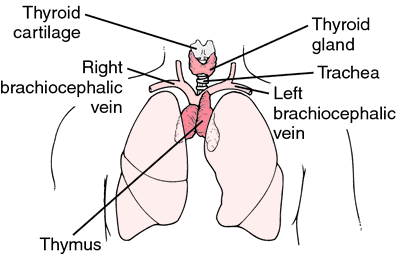Medical term:
hyperthymism
thymus
[thi´mus]a ductless gland lying in the upper mediastinum beneath the sternum; it reaches its maximum development during puberty and continues to play an immunologic role throughout life, even though its function declines with age. During the last stages of fetal life and the early neonatal period, the reticular structure of the thymus entraps immature stem cells arising from the bone marrow and circulating in the blood. The thymus preprocesses these cells, causing them to become sensitized and therefore capable of maturing into a specific differentiated type of lymphocyte. After sensitization by the thymus, the cells reenter the blood and are transported to developing lymphoid tissue, where they seed the cells that eventually become T lymphocytes, a type essential to the development of cell-mediated immunity. If the thymus is removed or becomes nonfunctional during fetal life, the lymphoid tissue fails to become seeded with the sensitized lymphocytes and the body's cell-mediated arm of immunity fails to develop. It is this arm of immunity that is mainly responsible for rejection of organ transplants and resistance to intracellular microbial infection, and perhaps plays a role in natural resistance to cancer.

Thymus.
Miller-Keane Encyclopedia and Dictionary of Medicine, Nursing, and Allied Health, Seventh Edition. © 2003 by Saunders, an imprint of Elsevier, Inc. All rights reserved.
hy·per·thy·mism
(hī'pĕr-thī'mizm),Excessive activity of the thymus gland; formerly postulated to be a causal factor in certain instances of unexpected and sudden death, such as status thymicolymphaticus.
Synonym(s): hyperthymization
Farlex Partner Medical Dictionary © Farlex 2012
hyperthymism
(hī′pər-thī′mĭz′əm)n.
Excessive activity of the thymus gland.
hy′per·thy′mic adj.
The American Heritage® Medical Dictionary Copyright © 2007, 2004 by Houghton Mifflin Company. Published by Houghton Mifflin Company. All rights reserved.
hyperthymism
An obsolete term for an alleged increase in thymic size, resulting in status thymolymphaticus; this “condition” was commonly excised or ablated in the 1940s and 1950s, but ultimately proved to correspond to (normal) physiologic hypertrophy of the thymus gland.Segen's Medical Dictionary. © 2012 Farlex, Inc. All rights reserved.
hy·per·thy·mism
(hī'pĕr-thī'mizm)Excessive activity of the thymus gland; formerly postulated to be a causal factor in certain instances of unexpected and sudden death.
Medical Dictionary for the Dental Professions © Farlex 2012
Latest Searches:
Voraxaze - Voranil - Voorhoeve - voodoo - VOO - Vontrol - von - vomitus - vomiturition - vomitory - vomitoria - vomito - vomitive - vomiting - vomit - vomica - vomerovaginalis - vomerovaginal - vomerorostralis - vomerorostral -
- Service manuals - MBI Corp